Doggy DNA is a huge and popular topic and my podcast with Georgina Richardson, the Head of UK for Kinship, revealed exactly why dog DNA testing is just as important as it is interesting. UK for Kinship is the innovation division of Mars Petcare and home of Wisdom Panel™, the world’s most accurate DNA test for dogs, so a great place to start to find out more.
How did DNA tests for dogs start?
Huge scientific breakthroughs in human DNA mapping started in the early 2000s and dog DNA mapping began almost immediately after this. Georgina revealed that dogs were prioritised because they’re an excellent model for human health conditions, so being able to detect markers for cancers & other human health conditions and mapping them back to canine species is really interesting to scientists.
As any owner can tell you, dogs are complex! Dog DNA testing helps us understand significantly more about their life expectancy, disease risk and traits.
Dog DNA and breeding
The considerable human intervention in dog breeding has resulted in a lot of genetically diverse examples, making dogs a unique species in that respect, whilst dog breeding has been part of history for years, so it’s important to understand more. Certainly, as a vet I’ve seen both the benefits and problems that result from forced breeding.
It’s an observation Georgina agrees with: ‘As humans, as we start to breed dogs and cats for what we want and what’s desirable to us, it’s probably even more important to get closer to the genetic diversity within the animal to ensure we’re breeding safely.’
Many reputable breeders already undertake dog DNA testing, but checking dog DNA before breeding is also important for ‘hobby’ breeders, such as pet parents breeding their dogs because they’d like another puppy. This would help people understand their responsibilities as owners first and beyond that in breeding their pets.
So what can DNA tests tell us about dog breeds?
Dog DNA testing allows us to research breed heritage in the same way that testing human DNA helps us uncover ancestry and discover ourselves. Georgina shared that this works in a similar way at Wisdom Panel™:
‘We talk about understanding your dog’s breed as really important for being able to tailor things like nutrition. If you’re able to understand the primary breed mixes within your pet you’re able to provide the best nutrition for that breed. Also, exercise requirements and making sure the pet is getting the right amount of training and exercise.’
It’s also about supporting training and behaviour, enabling owners to tailor and amend training based on the dog’s primary breeds.
Health screening
Alongside providing information about behaviour and training, understanding more about your dog’s primary breed(s) also informs health-based conversations with the vet. For instance, the Wisdom Panel™ Premium test runs over 206 genetic tests, making it possible to highlight potential conditions which are prevalent from one breed to another, such as bleeding and neuromuscular disorders or cancers.
The health screening also includes common disorders, including the MDR1 gene which is a medication sensitive gene. Identifying this means following up with your vet, to avoid certain medications and tablets. As another example, finding out your labrador’s excessive interest in food and increased appetite is down to an obesity risk gene means you have important information to share. When you receive the report it’s easy to download it and take a copy to the vet for further guidance and to help prioritise any genetic health tests.
Georgina revealed that whilst most owners primarily undertake dog DNA testing out of breed-curiosity, there’s a growing interest in the health screening side too. ‘We’re seeing more recent thirst from pet owners who are concerned about their own health, looking for health information, particularly pedigree dog owners. This emergent interest in genetic dog health is now starting in cats.’
From a professional pet-care perspective, wouldn’t it be exciting if this interest became part of affordable, responsible dog ownership and as ubiquitous as micro-chipping: get the chip, get the DNA test and tailor nutrition, health and training to your dog’s needs with confidence?
Doggy database reveals relatives
We often think of human ancestry as being a way to discover long lost relatives and this is certainly true for some DNA tests for dogs too. Having tested over 3 million pets, Wisdom Panel™ has the largest canine database globally. This not only allows greater accuracy in breed, health and trait screening, but also affords greater potential for matching with canine relatives. At the time of testing, owners can indicate if they’re happy to be contacted if there’s a close match, so revealing a relative could mean reuniting a pet with its ‘pack’.
DNA tells all about traits
Generally, traits are those physical features and attributes within the species as a whole and different breeds specifically. But how does such knowledge help? A dog DNA test will reveal information about a dog’s general appearance, like coat and colouring – helping us be aware of allergen potential in the case of shedding, for example. It also reveals details about fun traits known as ‘furnishings’ which can explain our dog’s floppy ears or blue eyes!
From cheek to report
Dog DNA testing is usually done via a kit, which includes swab and instructions. Once it arrives it’s a simple process to swab and return. The swab is then processed and the results come through in around 2 – 3 weeks.
From report to rescue
Whilst the whole topic is fascinating, two parts of this podcast really stood out for me. One was the big reveal from the DNA test for my dog Rodney, the other was the role dog DNA testing has in successful rehoming for rescue dogs, as Georgina explained:
‘A volunteer in a rescue shelter in Greece was using testing to help dogs who had been in shelters for a long time with no interest. For the dogs, the DNA became a ‘get out of jail free card’ [the shelters] saw these dogs rehomed immediately afterwards because new owners were able to know more about the dog. The idea that we can help forgotten dogs is really powerful and kind of brings a tear to my eye because it’s just so heartwarming and wonderful.’
There’s so much more to hear and explore in my podcast episode below
To find out more about pet DNA testing with Wisdom Panel™ visit wisdompanel.com
 Dr Paul Manktelow is a vet who’s worked for almost 20 years on the front line in some of the UK’s busiest veterinary hospitals. As Chief Vet in the Charity Sector, he leads a team of vets and nurses that treat thousands of pets every year. Paul also appears regularly in the media as a TV and radio presenter, writer, public speaker and podcast producer.
Dr Paul Manktelow is a vet who’s worked for almost 20 years on the front line in some of the UK’s busiest veterinary hospitals. As Chief Vet in the Charity Sector, he leads a team of vets and nurses that treat thousands of pets every year. Paul also appears regularly in the media as a TV and radio presenter, writer, public speaker and podcast producer.






Leave A Comment